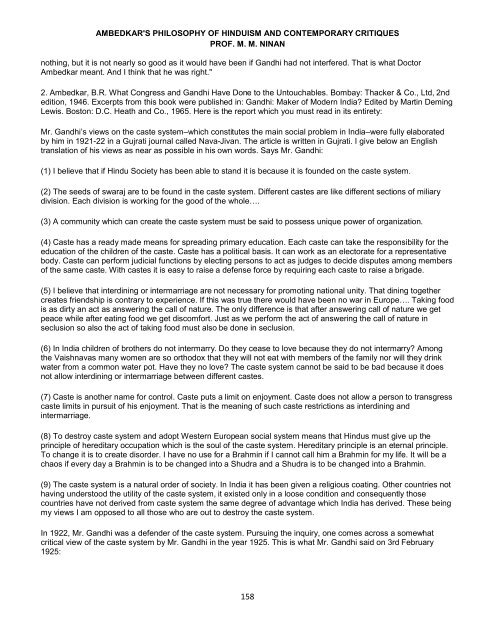Ambedkar-Philosophy of Hinduism
You also want an ePaper? Increase the reach of your titles
YUMPU automatically turns print PDFs into web optimized ePapers that Google loves.
AMBEDKAR'S PHILOSOPHY OF HINDUISM AND CONTEMPORARY CRITIQUES<br />
PROF. M. M. NINAN<br />
nothing, but it is not nearly so good as it would have been if Gandhi had not interfered. That is what Doctor<br />
<strong>Ambedkar</strong> meant. And I think that he was right."<br />
2. <strong>Ambedkar</strong>, B.R. What Congress and Gandhi Have Done to the Untouchables. Bombay: Thacker & Co., Ltd, 2nd<br />
edition, 1946. Excerpts from this book were published in: Gandhi: Maker <strong>of</strong> Modern India? Edited by Martin Deming<br />
Lewis. Boston: D.C. Heath and Co., 1965. Here is the report which you must read in its entirety:<br />
Mr. Gandhi’s views on the caste system–which constitutes the main social problem in India–were fully elaborated<br />
by him in 1921-22 in a Gujrati journal called Nava-Jivan. The article is written in Gujrati. I give below an English<br />
translation <strong>of</strong> his views as near as possible in his own words. Says Mr. Gandhi:<br />
(1) I believe that if Hindu Society has been able to stand it is because it is founded on the caste system.<br />
(2) The seeds <strong>of</strong> swaraj are to be found in the caste system. Different castes are like different sections <strong>of</strong> miliary<br />
division. Each division is working for the good <strong>of</strong> the whole.<br />
(3) A community which can create the caste system must be said to possess unique power <strong>of</strong> organization.<br />
(4) Caste has a ready made means for spreading primary education. Each caste can take the responsibility for the<br />
education <strong>of</strong> the children <strong>of</strong> the caste. Caste has a political basis. It can work as an electorate for a representative<br />
body. Caste can perform judicial functions by electing persons to act as judges to decide disputes among members<br />
<strong>of</strong> the same caste. With castes it is easy to raise a defense force by requiring each caste to raise a brigade.<br />
(5) I believe that interdining or intermarriage are not necessary for promoting national unity. That dining together<br />
creates friendship is contrary to experience. If this was true there would have been no war in Europe. Taking food<br />
is as dirty an act as answering the call <strong>of</strong> nature. The only difference is that after answering call <strong>of</strong> nature we get<br />
peace while after eating food we get discomfort. Just as we perform the act <strong>of</strong> answering the call <strong>of</strong> nature in<br />
seclusion so also the act <strong>of</strong> taking food must also be done in seclusion.<br />
(6) In India children <strong>of</strong> brothers do not intermarry. Do they cease to love because they do not intermarry? Among<br />
the Vaishnavas many women are so orthodox that they will not eat with members <strong>of</strong> the family nor will they drink<br />
water from a common water pot. Have they no love? The caste system cannot be said to be bad because it does<br />
not allow interdining or intermarriage between different castes.<br />
(7) Caste is another name for control. Caste puts a limit on enjoyment. Caste does not allow a person to transgress<br />
caste limits in pursuit <strong>of</strong> his enjoyment. That is the meaning <strong>of</strong> such caste restrictions as interdining and<br />
intermarriage.<br />
(8) To destroy caste system and adopt Western European social system means that Hindus must give up the<br />
principle <strong>of</strong> hereditary occupation which is the soul <strong>of</strong> the caste system. Hereditary principle is an eternal principle.<br />
To change it is to create disorder. I have no use for a Brahmin if I cannot call him a Brahmin for my life. It will be a<br />
chaos if every day a Brahmin is to be changed into a Shudra and a Shudra is to be changed into a Brahmin.<br />
(9) The caste system is a natural order <strong>of</strong> society. In India it has been given a religious coating. Other countries not<br />
having understood the utility <strong>of</strong> the caste system, it existed only in a loose condition and consequently those<br />
countries have not derived from caste system the same degree <strong>of</strong> advantage which India has derived. These being<br />
my views I am opposed to all those who are out to destroy the caste system.<br />
In 1922, Mr. Gandhi was a defender <strong>of</strong> the caste system. Pursuing the inquiry, one comes across a somewhat<br />
critical view <strong>of</strong> the caste system by Mr. Gandhi in the year 1925. This is what Mr. Gandhi said on 3rd February<br />
1925:<br />
158


















